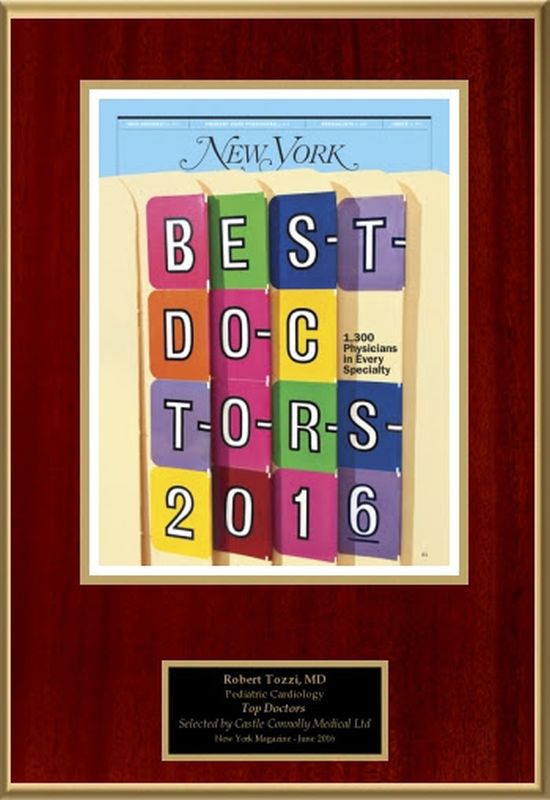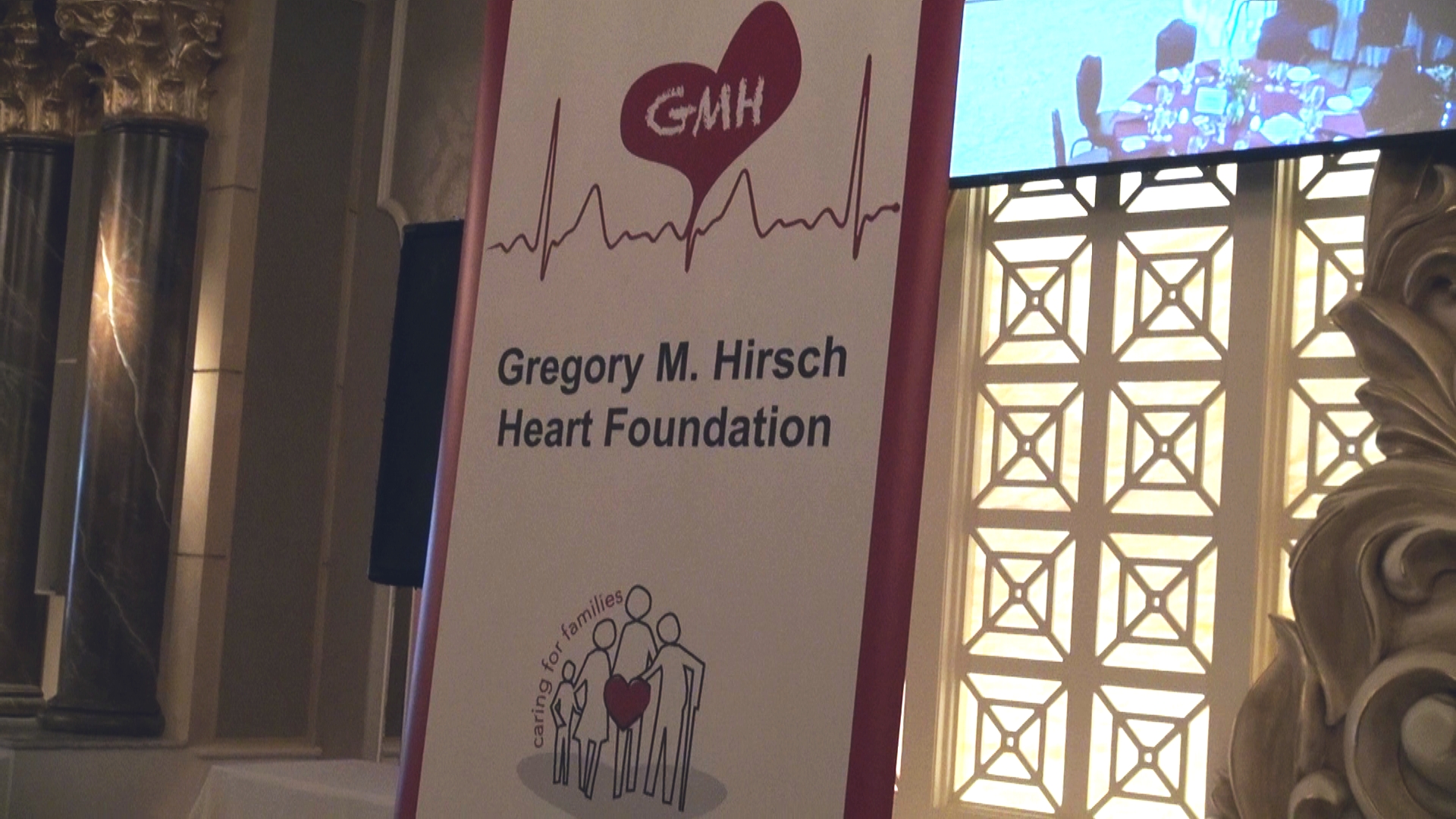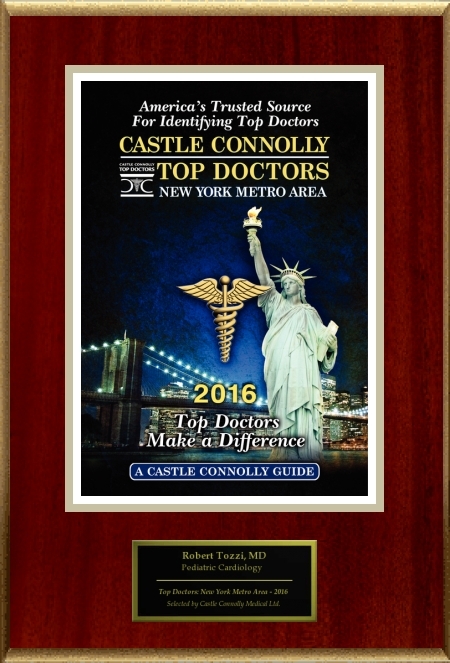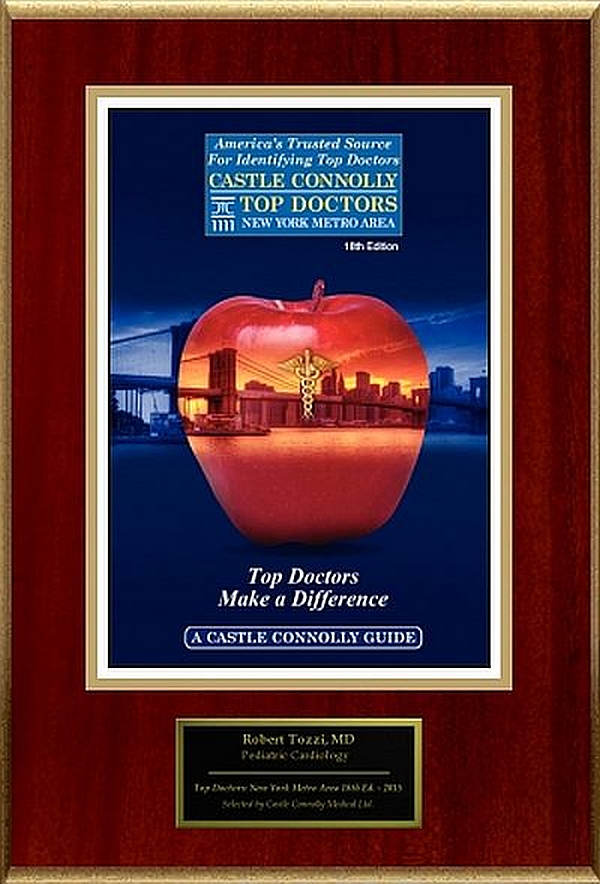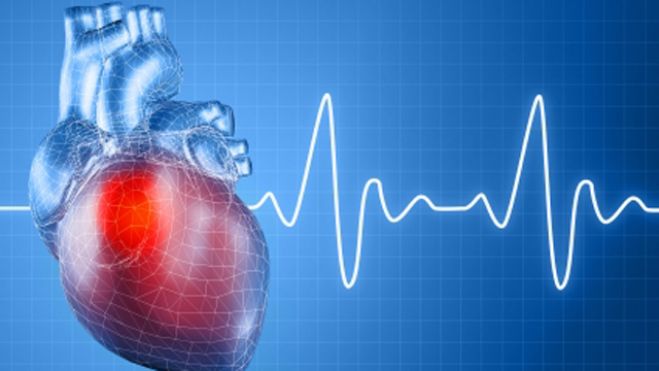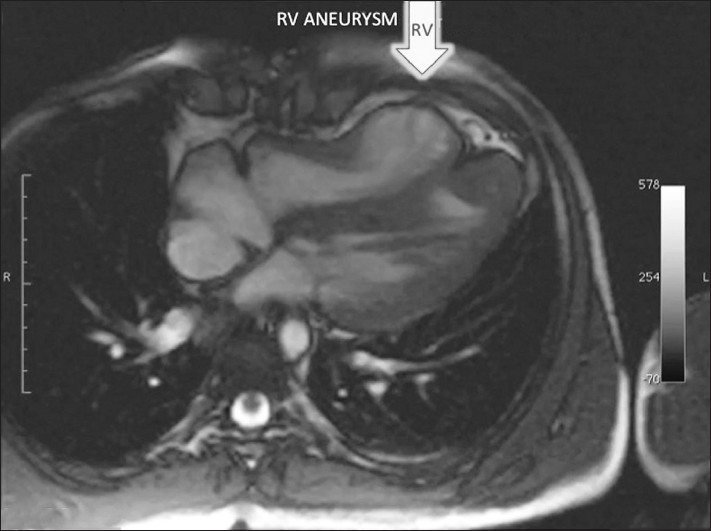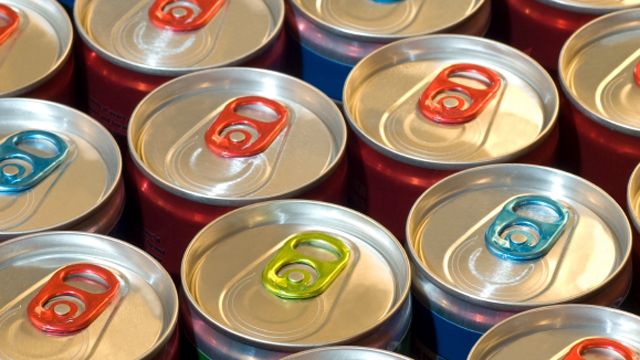Dr. Robert J. Tozzi was once again honored with this peer-nominated and physician-researched award, selected as a Castle Connolly Top Doctor® as included in the New York Magazine roll-call of Top Doctors 2016.
Category Archives: HC Update
Gregory M. Hirsch Heart Foundation: Evening from the Heart, May 13, 2015
Dr. Robert J. Tozzi Cited as Castle Connolly 2016 Top Doctor, New York-Metro Area
Tenafly Students Offered Screenings for Deadly Heart Abnormality, Northjersey.com, 15 February 2016
Dr. Robert Tozzi Recognized Among Castle Connolly Top Doctors – New York Metro Area 2015
Dr. Robert J. Tozzi Ranked Among New York Magazine’s Best Doctors 2015
Dr. Robert J. Tozzi Garners Major Kudos as “Top Doctor” for 2014
19-Year-Old Male Athlete With Bicuspid Aortic Valve and Athletic Heart Needing Clearance Prior to Professional Soccer Tryout
Today’s Health Watch: 10-year-old UAE-based Pinoy with rare heart defect to undergo operation in India
A 10-year-old Filipino boy with a rare congenital heart defect is heading for India to undergo an operation, after a foundation offered to sponsor the procedure. Gil Merced and his parents will travel to Kochi for the operation, according to a report on UAE news site Khaleej Times on Sunday. READ MORE
Screenings Held in Waldwick Boy’s Memory Detect Heart Issues in 14 Bergen County Youths, Northjersey.com, 24 March 2014
10 Steps to Protect Against Hypertrophic Cardiomyopathy
Click on Image for FoxNews.com Posting
Published February 11, 2013
FoxNews.com
As if it were yesterday, I recall the death of 18-year-old Ben Breedlove, who suffered from hypertrophic cardiomyopathy (HCM), an ailment in which I specialize as a pediatric cardiologist.
I have seen it rob too many young people unnecessarily of a long and fulfilling life.
Here are 10 steps to protect your children, family members and anyone you love against the ravages of hypertrophic cardiomyopathy:
1. Remember that statistically if one member of your family has been diagnosed with HCM, then one-half of your family members are at risk for developing this disease. Evaluation of first-degree relatives on a regular, repetitive basis can go a long way towards correct diagnosis and effective treatment. It is imperative to extend this medical information to as many relatives as possible. Try to make the effort to contact others, even if you are estranged from them. Remember to breed love.
2. Always remember that hypertrophic cardiomyopathy is a sneaky disease: It is many times missed or misdiagnosed. Common diseases that are confused with HCM are asthma, mitral valve prolapse, anxiety, coronary artery disease and an athletic heart.
3. Be aware of symptoms that require prompt medical attention:
• Chest pain with exercise or simple activities such as walking.
• Passing out is a very important symptom that requires prompt medical attention.
• Shortness of breath, lightheadedness, and extreme tiredness are other symptoms of HCM.
4. Avoid circumstances that increase your risk:
• Avoid hot weather and dehydration.
• Be aware of the need for vigorous fluid resuscitation during infections or gastroenteritis or exercise.
• Avoid burst of activity.
• Avoid isometric activity.
5. With hypertrophic cardiomyopathy in humans, the lining of the blood vessels in the heart tends to be affected. Unfortunately, this is not just limited to the heart, but also involves the blood vessels networked to other organs throughout the body:
• Foods that improve the lining of your blood vessel include nuts, seeds, dark chocolate, fruits and vegetables.
• Prolonged periods of walking help revitalize the lining of your blood vessels.
• Foods that decrease the function of the lining of blood vessels include sugary drinks (soda), high salt, high fat, high sugar, high fructose corn syrup, and even high protein. Life is about balance and a balanced diet.
6. Beware of diseases or circumstances that can worsen hypertrophic cardiomyopathy, or cause it to progress faster:
• Sleep apnea, diabetes, obesity, hypertension, rapid weight gain and hypercholesterolemia.
• Steroids, including drugs like prednisone, anabolic steroids, and testosterone can aggravate the condition. The use of growth hormones or supplements that increase growth hormone or testosterone levels may also accelerate HCM.
7. Avoid drugs that can increase your risk of having a bad event:
• Avoid stimulants and decongestants.
• Avoid alcohol consumption as its diuretic effect can lead to decreased blood volume.
• If you are on a blood-thinner (e.g., Coumadin), remember to have your blood checked monthly.
• For any abrupt new onset of neurologic symptoms, such as muscle weakness, severe headache, or change in vision, seek prompt, urgent medical attention.
8. Once diagnosed with HCM, you are restricted from competitive sports and extremes of exercise, such as avoiding heavy lifting.
9. If you are on a beta blocker for HCM, it is imperative that it is taken daily. Missing a dose results in a rebound effect that can make your heart rate increase and put you at an increased risk.
10. Enjoy life, keep active and eat healthy. Most people with HCM have a normal life expectancy.
Dr. Robert J. Tozzi is Chief of Pediatric Cardiology and the Founding Medical Director of The Gregory M. Hirsch Hypertrophic Cardiomyopathy Center at the Hackensack University Medical Center in New Jersey. He is the co-author of several papers published in refereed research journals, and he has lectured extensively in his field at numerous professional conferences. To learn more, visit his website at DRTOZ.com.
Read more: http://www.foxnews.com/health/2013/02/08/10-steps-to-protect-against-hypertrophic-cardiomyopathy/#ixzz2KheuMOYG
A Celebration of Hope
Dr. Tozzi’s Patients Say Thank You
Hypertrophic Cardiomyopathy in a Young Adult with RV Aneurysm: Report of a Rare Finding and Review of the Literature
Dr. Robert Tozzi Offers His “Second Opinion”: The Dangers of Energy Drinks with Dr. Manny Alvarez, FoxNews.com, 22 March 2012
Dr. Tozzi’s Top 10 Reasons Why Energy Drinks are a Health Hazard
1. The marketing of fortified energy drinks relies to a great degree on predatory and 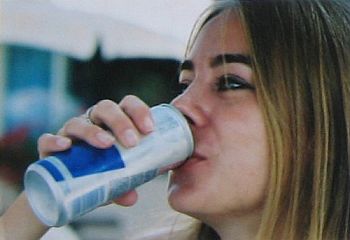 deceptive advertising. The companies that distribute these drinks prey on the ignorance of youth. Energy drinks do not fall into the same category of “refreshments” as juice, coffee or soda.
deceptive advertising. The companies that distribute these drinks prey on the ignorance of youth. Energy drinks do not fall into the same category of “refreshments” as juice, coffee or soda.
2. Energy drinks increase the body’s demand for oxygen, while decreasing blood volume (high osmolality) and the ability to bring blood flow to muscles and organs.
3. Consumption of one 8 oz. can of energy drink provides the total recommended daily allotment of sugar. The result is increased insulin levels and the promotion of obesity and dental cavities.
4. Use of energy drinks promotes a culture of drugs, not health – and can be the gateway to other forms of stimulant/drug use.
5. Energy drinks pose the potential for multiple caffeine-induced DSM-IV psychiatric disorders. The four disorders include:
-Caffeine intoxication
-Caffeine-induced anxiety disorder
-Caffeine-induced sleep disorder
-Caffeine-related disorder not otherwise specified
6. Energy drinks may be lethal when consumed by a child with an underlying undiagnosed cardiac condition.
7. When energy drinks are mixed with other medications or nutritional supplements, increased toxicity occurs. Combining these drinks with medications for ADHD, asthma or heart disease may be lethal.
8. Use of energy drinks with alcohol gives a misguided sense of not being intoxicated. The result is excessive consumption of alcohol and caffeine. This increases the risk of injury, abuse and death.
9. Regular consumption of energy drinks increases risk of MI (heart attack) or stroke by decreasing endothelial function and increasing platelet aggregation.
10. Toxic levels of caffeine may cause seizures, arrhythmias or death.
Energy Drink Dangers
Dr. Tozzi appears with Dr. Manny Alvarez on Health Talk at FoxNewsHealth.com, Nov. 17, 2010, to discuss how dangerous these caffeinated beverages can be (click on the blue link to view video at FoxNews.com): http://video.foxnews.com/v/4423504/
http://youtu.be/0ZrCje-ycbI
